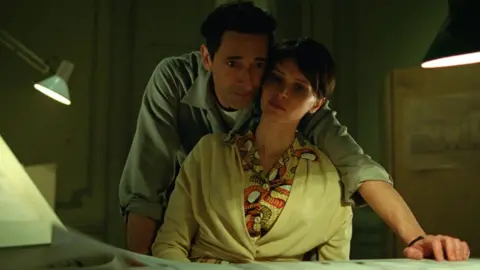 Getty Images
Getty ImagesA new report shows box office takings are still below pre-pandemic levels, despite the UK producing more films and television shows. But, the BFI’s chief executive tells BBC News, the industry is in good health overall.
UK box office revenue totalled £979m in 2024, with musical juggernaut Wicked taking the lion’s share with £59.6m in ticket sales.
The total was only marginally down on 2023, but the BFI’s report shows UK box office takings are still 22% below 2019, due in part to the Hollywood strikes and the ramifications of the Covid pandemic.
BFI chief executive Ben Roberts said the UK screen industries are not in crisis, but are beginning to stabilise after a tumultuous five years.
The report also highlighted the increase in production across the UK, with spending on British film and TV projects rising to a record £5.6bn.
Mr Roberts said this “demonstrates the UK’s strength as a world-leading destination for filmmaking”, showing that “Britain’s film and TV industries continue to be a powerhouse for creativity, investment and jobs”.
However, he acknowledged the data wasn’t entirely positive, saying.
“We know these figures don’t tell the whole story,” he said. “The 22% drop in domestic high-end TV spend is a reminder that many in the industry are feeling the pressure.”
Speaking to the BBC following the report’s publication, Mr Roberts, who has been in charge of the BFI since 2020, said he is “incredibly confident” in the industry’s continued recovery despite the mixed figures.
He pointed to the huge appetite for independent British and international films such as The Brutalist as evidence for audiences returning to cinemas for all types of films, not just blockbusters.
“The job right now I really feel is making sure that our offer is catering to everyone’s tastes”, he said.
However, Mr Roberts did acknowledge the struggled faced by cinemas across the country as streaming has changed viewing habits worldwide.
“We recognise that we need to make sure that cinemas across the country are prospering. We haven’t yet landed on the sort of simple solution to that prosperity but it’s our focus right now.”
The report comes just over a week before the Bafta Film Awards, the most important event in the British film calendar.
While stars prepare to walk the red carpet and see if they can take home a coveted trophy, the report indicates the UK screen industry is still in recovery mode as it struggles to match the record-breaking 2010s.
Before the pandemic, UK box office takings consistently exceeded £1bn annually across blockbusters and smaller releases.
Although 2024’s total take is only down 1% on 2023’s figure of £980m, it is still a far cry from 2019’s £1.3bn which saw audiences flock to cinemas for huge tentpoles such as Avengers: Endgame and Star Wars: The Rise of Skywalker.
Cinema admissions were lower in the first half of 2024 owing to a lack of major US studio releases but high-profile films surged in the last three months of the year.
Alongside Wicked, five of the top 10 highest-earning films were November or December releases, including family films Moana 2, Paddington in Peru and Mufasa: The Lion King.
Ridley Scott’s much-anticipated sequel Gladiator II earned £31.8m, while summer’s superhero blockbuster Deadpool & Wolverine took £57.8m despite both having higher age ratings.
 Universal Pictures
Universal PicturesAdrian Wootton OBE, chief executive of the British Film Commission, told BBC News that cinema closures paint “a problematic picture” for UK film.
“It’s really important for the creative lifeblood of cinema”, he said, “because I think it is the best place to start seeing movies”.
But, like Mr Roberts, he’s feeling “cautiously positive” about the future because 2024, he said, is a transitional year as the industry waits for the market to settle and reach a “new normal”.
He pointed to the introduction of new tax credits alongside increased investment in films and high end TV from streaming services as reasons for cautious optimism.




